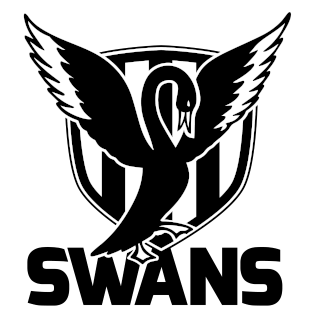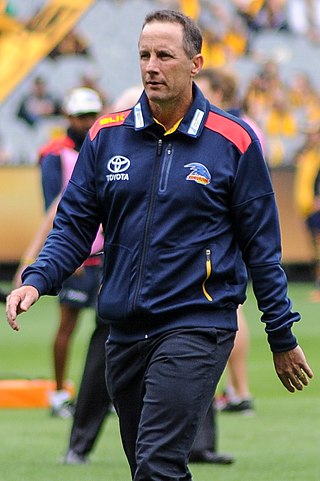Related Research Articles

Adam Roy Goodes is a former professional Australian rules footballer who played for the Sydney Swans in the Australian Football League (AFL). Goodes holds an elite place in VFL/AFL history as a dual Brownlow Medallist, dual premiership player, four-time All-Australian, member of the Indigenous Team of the Century and representative of Australia in the International Rules Series. In addition, he has held the record for the most VFL/AFL games played by an Indigenous player, surpassing Andrew McLeod's record of 340 during the 2014 AFL season before having his own record surpassed by Shaun Burgoyne during the 2019 AFL season.

Kevin John Sheedy AO is a former Australian rules football coach and player in the Australian Football League. He played and coached in a combined total of 929 games over 47 years from 1967 until 2013, which is a VFL/AFL record. Sheedy was inducted into the Australian Football Hall of Fame in 2008 and on 29 May 2018 was elevated to legend status.
Gregory Donald Williams is a former Australian rules footballer who represented Geelong, the Sydney Swans and Carlton in the Australian Football League (AFL) during the 1980s and 1990s. A midfielder, he is a dual Brownlow Medal winner and at his peak was the then-highest-paid player in the history of the sport, including an under-the-table $200,000 bonus payment. He was also linked to further controversy during the 1990s.

The Swan Districts Football Club, nicknamed the Swans, is an Australian rules football club playing in the West Australian Football League (WAFL) and WAFL Women's (WAFLW). The club is based at Bassendean Oval, in Bassendean, an eastern suburb of Perth, Western Australia. The club was formed in 1933, and joined the then-Western Australian National Football League (WANFL) in 1934, acting as a successor to the Midland Junction Football Club, which had disbanded during World War I, in the Perth Hills region.
James Gordon Krakouer is a former Australian rules footballer who played in the 1980s and '90s for North Melbourne and St Kilda in the VFL and Claremont in the WAFL. He is the father of former Richmond and Collingwood AFL player Andrew Krakouer and is renowned for his quickness, skill, courageous play, and his ability to pass to his brother Phil from seemingly almost any position. His career, however, has been overshadowed by his extensive criminal history.

Michael Raymond Malthouse is a former Australian rules footballer, who played for the St Kilda Football Club and Richmond Football Club in the Victorian Football League (VFL).

Donald Lachlan Pyke is a former Australian rules footballer who is the CEO of the West Coast Eagles having previously been an assistant coach at the Sydney Swans. He was formerly the senior coach of the Adelaide Football Club in the Australian Football League (AFL). He played for the West Coast Eagles from 1989 to 1996.

Christopher Douglas Mainwaring was an Australian rules footballer who played for the West Coast Eagles in the Australian Football League (AFL) and for the East Fremantle Football Club in the West Australian Football League (WAFL).
Dale Mathew Kickett is a former Australian rules footballer who played for Fitzroy, West Coast Eagles, St Kilda, Essendon and Fremantle. Having played for five different clubs over his career spanning from 1990 until 2002, Kickett shares the record for playing for the most VFL/AFL clubs.

Neil Allen Balme is a former Australian rules footballer who played for the Richmond Football Club in the Victorian Football League (VFL), as well as for the Subiaco Football Club in the Western Australian National Football League (WANFL) and the Norwood Football Club in the South Australian National Football League (SANFL).
Robert "Robbie" Muir is an Indigenous former Australian rules football player for the St Kilda Football Club in the Victorian Football League (VFL). He also played for West Torrens Football Club and Woodville Football Club in the South Australian National Football League (SANFL).
Jason Love is a former Australian rules footballer who played in the Australian Football League (AFL).
Malcolm Gregory "Mal" Brown is a former Australian rules footballer in the Victorian Football League and West Australian National Football League. He is described as "one of the most colourful and controversial characters" of the game.

Chance Bateman is an Australian rules football coach and former player who played for the Hawthorn Football Club in the Australian Football League.
Ryan Edwin Turnbull is a former Australian rules footballer who represented the West Coast Eagles in the Australian Football League (AFL). Turnbull was a member of the Eagles' 1994 premiership side, and was the club's first-choice ruckman for much of the 1990s. He also played with the Claremont and East Perth Football Clubs in the West Australian Football League (WAFL), and was awarded the Sandover Medal in 2001 as the best player in the competition, as well as winning the Simpson Medal in 2001 and 2002 as the best player in the league's grand final. In State of Origin football, Turnbull represented Western Australia in five matches between 1992 and 1999, and captained a Western Australian representative team in 2003.
Thomas Swift is a former Australian rules footballer listed with the West Coast Eagles in the Australian Football League (AFL). Educated at Christ Church Grammar School, he originally played for the Claremont Football Club in the West Australian Football League (WAFL), and was recruited by West Coast with the 20th pick overall at the 2008 National Draft. He made his debut for the club in the 2009 season.
Nicholas G. Stone is a former Australian rules footballer who played with the West Coast Eagles in the Australian Football League (AFL). He was the first person to be charged under the AFL's anti-doping code with recreational drug.
Gerrick Peter Weedon is an Australian rules footballer who previously played with the Claremont Football Club in the West Australian Football League (WAFL) and the West Coast Eagles in the Australian Football League (AFL). Originally from the Kimberley region of Western Australia, Weedon moved to Perth to play for Claremont, before being recruited by West Coast with the 22nd pick overall in the 2009 National Draft, playing his first game for the club in round seven of the 2011 season. Due to his inability to break into West Coast's senior side, Weedon spent most of his time at the club playing in the WAFL, playing in Claremont's premiership sides in both 2011 and 2012. He was delisted from West Coast at the end of the 2012 season.
Irwin Lewis was an indigenous Australian artist, who was previously a notable scholar, sportsman and public servant. Best known as the father of Australian rules footballer Chris Lewis, a member of the West Coast Eagles' AFL premiership-winning teams in 1992 and 1994, he has been described as "something of a celebrity in Perth".
Racism in sport in Australia has a long history, with one researcher finding examples from the 19th century. Since the 1990s, there have been a number of cases of racial vilification reported, with the various codes of sport tackling the problem in a variety of ways.
References
- ↑ Chris Lewis profile on westcoasteagles.com.au Archived 28 September 2007 at the Wayback Machine
- ↑ Chris Lewis' player profile at AFL Tables